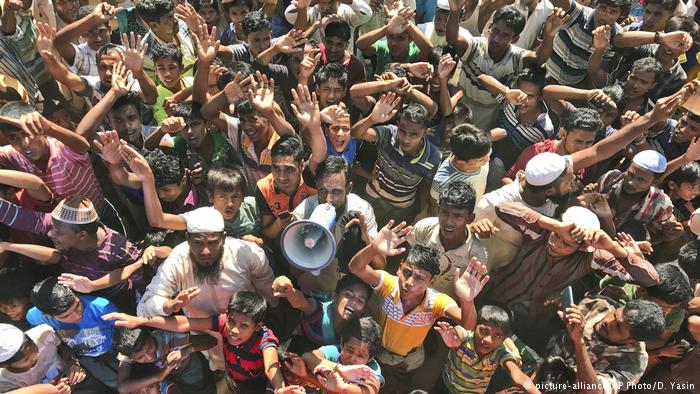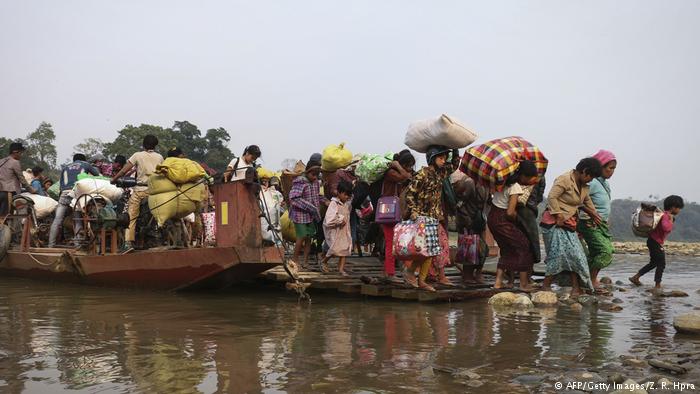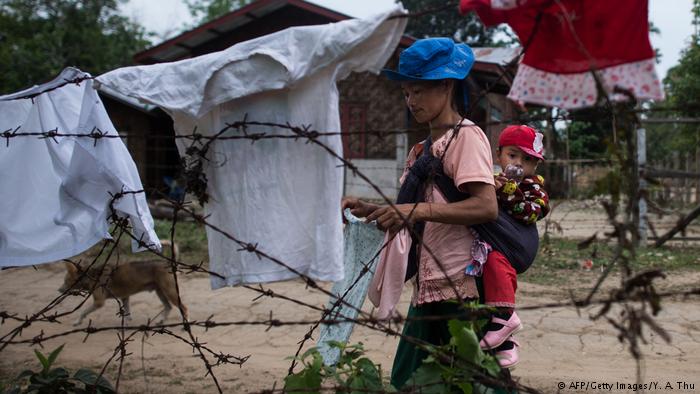Thousands of Myanmar Women Forced into Marriages in China
ASIA-UPDATES ON MYANMAR ROHINGYA GENOCIDE, 10 Dec 2018
Deutsche Welle – TRANSCEND Media Service
Over 7,000 Myanmar women and girls have been sent to China and forced into marriage and childbirth. The crisis is being fueled by problems on both sides of the border.
7 Dec 2018 – Thousands of vulnerable women and girls from northern Myanmar are being trafficked to China and forced to marry and have children, according to a report released Friday.
An estimated 7,500 women from the war-torn Kachin and northern Shan states were sold to men across the border between 2013 and 2017, the study by the Johns Hopkins Bloomberg School of Public Health reported.
The youngest women were sold for $15,000 (around €13,000).
Interviews with more than 400 victims in Myanmar and China revealed most of the victims were forced to bear children before sometimes being sold on to a second husband.
One woman told how she was trafficked into China three times, each time being “pushed into giving birth,” according to Moon Nay Li of Kachin Women’s Association Thailand, who led the field research in Kachin and Shan states.
Problems on both sides
The conflict between ethnic insurgents and government forces, as well as persistent human rights abuses in northern Myanmar, have forced thousands of undocumented women and girls into the arms of traffickers.
“Because of the political instability, conflict and land confiscation … security for women is a big challenge,” said Moon Nay Li.
Marriages are often brokered by the women’s own families or village elders, with the women unable to refuse.
Daughters often “can’t say no to their parents,” said Moon Nay Li, and are forced to go ahead with the marriage once “traffickers and agents have given money to their parents.”
Meanwhile, China’s previous one-child policy has resulted in men outnumbering women by around 34 million, fueling demand for trafficked women from neighboring countries.
The husbands are often older, sick or disabled men from rural areas who are considered undesirable to the Han Chinese.
Without documentation, the women often get trapped, and can even be sold on to others after giving birth to allow their husbands to recoup the cost.
A call to action
“Victims of forced marriage suffer a range of rights violations and exposure to physical and psychological risks,” said Courtland Robinson, an associate professor at the Bloomberg School and the study’s lead author.
“This research draws attention to the scope of the problem and to the urgent need for support services for victims.”
While the study recognizes that some women were happily married, it calls for Myanmar to end internal conflicts and ensure citizens have identification documents to allow them to live and work legally in China.
It also calls on Myanmar to train anti-trafficking officials and recognize the women as victims.

Rohingya in Bangladesh resist repatriation attempt. Rohingya protests blocked Bangladesh repatriation efforts. 150 Rohingya Muslims were meant to be repatriated to Myanmar, but protests put a stop to the operation. Hundreds of people chanted “we will not go” at a demonstration near the Myanmar border, and Bangladeshi authorities acknowledged that none of the refugees who were meant to be repatriated showed up or wanted to return.
_______________________________________________
DW recommends:
- Fresh Myanmar violence sends thousands fleeing
- Thousands of people have been displaced amid renewed clashes between Myanmar’s army and a rebel group in the country’s remote northeast. One militiaman said it was the worst violence the region had seen in five decades. (28.04.2018)
- How has the one-child policy affected China?
- China resorted to a one-child policy in 1979 to limit its then-ballooning population, and then over three decades later changed it to a two-child policy. Experts say it cannot be a model for other countries. (19.07.2018)
- Rohingya people in Myanmar: What you need to know
- What makes Myanmar’s Rohingya Muslims one of the most persecuted communities in the world? What is the conflict between the majority Buddhists and the minority Rohingya all about, and what should be done to resolve it? (12.09.2017)
- Thousands cross from Myanmar to China amid border violence
- Clashes between Myanmar military and ethnic Chinese rebels in the Kokang region have created a situation of panic among border residents. The fighting jeopardizes a nationwide peace process. (08.03.2017)
- China’s two-child policy comes into effect
- Couples in China are allowed to have two children from now on. The Chinese government implemented the law after concerns related to the country’s shrinking population and aging workforce. (01.01.2016)
- Myanmar insurgents attack casino and security forces near Chinese border
- The ethnic rebels attacked security force posts and a casino near the main border post with China. The conflict in the north of Myanmar has escalated as the media focus remains on the Rohingya crisis in the west. (12.05.2018)
- Rohingya in Bangladesh resist repatriation attempt
- More than 700,000 Rohingyas have fled to Bangladesh to escape violence. On Thursday, the first repatriations to Myanmar were due to start, but the refusal of many refugees to go back brought the operation to a halt. (15.11.2018)
DISCLAIMER: The statements, views and opinions expressed in pieces republished here are solely those of the authors and do not necessarily represent those of TMS. In accordance with title 17 U.S.C. section 107, this material is distributed without profit to those who have expressed a prior interest in receiving the included information for research and educational purposes. TMS has no affiliation whatsoever with the originator of this article nor is TMS endorsed or sponsored by the originator. “GO TO ORIGINAL” links are provided as a convenience to our readers and allow for verification of authenticity. However, as originating pages are often updated by their originating host sites, the versions posted may not match the versions our readers view when clicking the “GO TO ORIGINAL” links. This site contains copyrighted material the use of which has not always been specifically authorized by the copyright owner. We are making such material available in our efforts to advance understanding of environmental, political, human rights, economic, democracy, scientific, and social justice issues, etc. We believe this constitutes a ‘fair use’ of any such copyrighted material as provided for in section 107 of the US Copyright Law. In accordance with Title 17 U.S.C. Section 107, the material on this site is distributed without profit to those who have expressed a prior interest in receiving the included information for research and educational purposes. For more information go to: http://www.law.cornell.edu/uscode/17/107.shtml. If you wish to use copyrighted material from this site for purposes of your own that go beyond ‘fair use’, you must obtain permission from the copyright owner.
Read more
Click here to go to the current weekly digest or pick another article:
ASIA-UPDATES ON MYANMAR ROHINGYA GENOCIDE:

